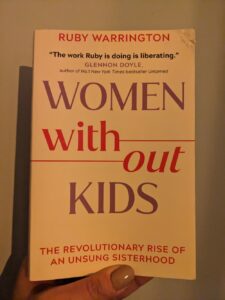Women Without Kids by Ruby Warrington
Written by Ashley Kelmore, Posted in Reviews
Best for:
People who would rather work through issues using a book than in therapy?
In a nutshell:
Childfree author Warrington explores the different ways that not having children influences the lives women lead.
Worth quoting:
“Is the meaning of life really only to create more life?”
From responses to a survey the author conducted:
“I saw how broken my mother was, and I didn’t agree with her assertion that her personal sacrifice should be seen as a gift/blessing to me. That rationale didn’t make sense. I didn’t want that ‘gift.’ It creates an unwanted expectation that I should meet her needs. I would have preferred for her to find fulfillment through personal exploration and growth.”
Why I chose it:
I am childfree. I had a friend sort of wonder why I’d read this – what was hoping to learn – since I’m solidly childfree, and I don’t need external validation of that choice. But I realized its not so much what I’m hoping to learn, it’s about feeling seen and understood. Unfortunately this book didn’t really do that, but the author certainly tried.
Review:
Hmm. This book was a challenge to get through, though there are some parts I found interesting for sure. First, it starts strong with the title the author wanted to give it: Selfish Cunts. I mean, come on. That’s gold. In the first chapter, the author talks about how society in the US and UK is not at all pro family, but extremely pronatalist – folks want women to have a lot of kids, but don’t want to support them and their families in ensuring those kids are taken care of.
She then looks at what she calls the motherhood spectrum, running from Affirmative yes (definitely want kids) to Affirmative no (definitely does not want kids). I was an ‘I think I have to, right?’ yes in my college years, but by my mid 20s I was very much an Affirmative no, and as someone in her mid-40s, married to a man who definitely does not want kids, I remain so. I do not want and will not be having kids.
From there, the book sort of wanders into a few places that I wasn’t expecting, I think because the author tries to cover a lot of childfree ground. She (rightly) discusses across many chapters the lack of support for mothers and how fucking hard it is to be a parent. But for me, I didn’t choose a life without children due to the lack of support – I chose it because I have no desire to parent. If I knew I’d have free childcare, a huge village supporting me, involved grandparents, and loads of income to spend on the child’s growth, I still would not want children. It is the having of the children, and the raising of the children, that has never appealed to me, regardless of the support I might have. And while Warrington does (I think) mention this type of childfree person, and might even consider herself as such, the book isn’t really for folks like that.
The last quarter of the book I found especially challenging to read. There’s a chapter where she tries (unsuccessfully, I think) to discuss what parents might face when their child has significantly higher support needs as compared to most other children. It feels, despite the author’s efforts, a bit ableist. I know she tries hard to avoid that (even discussing ableism within the chapter), but I don’t think she succeeds there.
Then there’s the chapter that, despite the author specifically saying this isn’t what she means, feels like it is telling childfree people we have to be super productive and contribute significantly to the world in a unique way since we aren’t having kids. This bleeds into a chapter that is all about climate change, which, yes, needs to be discussed, but just felt out of place. And there’s a whole memoir-esque bit where she talks about coming to terms with her mother, which felt sort of like what people who have kids think about people who don’t – that our parents must be the reason. And for some people, that’s obviously the case! But this felt like it was universalizing a non-universal experience.
And finally, throughout multiple places across every chapter, the author throws in … I guess ‘reflection’ questions? They would often pop out of nowhere and take me right out of what I was reading. I appreciate the author trying to use this book to help women reflect, but the way it was done did not work for me at all.
What’s next for this book:
Probably recycle it as I wrote a lot in it and not interested in that making its way to the charity shops.

